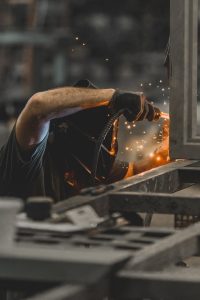
Safety at work is one of the most important and immediate concerns in every industrial workplace. Particularly in this high-risk area, the staff members can ensure total protection for the workers by providing suitable safety equipment. Industrial workers perform several duties that are highly hazardous to their health. Here, it is essential to appreciate the benefits of using protective gear and implementing stringent safety controls.
The employer’s responsibility is to prevent avoidable hand injuries, yet statistics reveal that many of them slip between the gaps. The likelihood is that your safety program addresses the main safety risks present at your workplace, including slip-and-fall risks, height-related risks, and the possibility of being hit by flying debris.
However, there may be several risks that you are omitting that are right at your fingertips. When did you last review your organization’s safety glove standards for cleaning and maintenance jobs? When did you last compare different types of gloves, such as vinyl vs. nitrile gloves, rubber vs. latex gloves, and so on, suitable for the workers?
Let’s look at a few key reasons facility workers should wear hand protection when performing their next cleaning activity.
Protecting Yourself From Contact Dermatitis
Problem: A contact dermatitis rash that is excruciatingly uncomfortable, itchy, and burning is the last thing you need. Exposure to different cleaning solutions, soaps, or an allergy might result in contact dermatitis.
Solution: Selecting an excellent all-purpose reusable safety glove can help keep your hands secure and in good shape. Or you might prefer biodegradable safety gloves if you want to be ecologically careful but require a throwaway glove.
Protect Yourself From Chemical Burns
Problem: Many cleaning solutions contain harmful ingredients that irritate or burn your skin. Ammonia, bleach, lye, hydrochloric acid, formaldehyde, toxic acids, and petroleum distillates, for example, can burn and release lethal vapors.
Solution: Wearing gloves that protect you from various substances is your best option. They also absorb sweat, which is an added benefit compared to other chemical gloves, which is a regular complaint.
Protect Yourself From Contagious Diseases
Problem: Industrial facilities are frequently the scene of accidents and injuries. When they occur, cleanup is required. The work can be hazardous as well as quite horrendous. Bloodborne pathogens, infectious illnesses, and the common cold virus are all things that bodily fluids can transport.
Solution: If you have the job of cleaning up blood or bodily fluids, you should prepare yourself with the appropriate safety equipment. You can guard against several communicable diseases and other high-risk risks using medical-grade safety gloves. On the other hand, wearing food-safe gloves is crucial if your profession requires you to handle any food.
Protect Yourself From Sharp Objects
Problem: When selecting a safety glove for cleaning or maintenance tasks, you should consider any potential risks. Will workers be exposed to needles, blades, or surfaces with sharp edges?
Solution: Pick hand protection that is puncture- and abrasion-resistant if workers will be exposed to needles, shattered glass, nails, splinters, wire, or sharp instruments. But not every pair of safety gloves is made equally.
Protect Yourself From Heat/Cold
Problem: Be mindful of the surfaces that need to be cleaned. Exist threats from welding equipment, operating machinery, open flames, or extreme heat? Will workers be exposed to freezers, coolers, or other refrigeration equipment?
Solution: If you’ve ever touched a hot pipe or worked in a refrigerator or freezer, you know how crucial it is to wear gloves that can withstand extreme temperatures. Wearing protective gloves that aren’t appropriate for the work environment exposes your hands to unnecessary risks. Don’t you think it matters? Try performing your duties without those two valuable limbs. Fortunately, some gloves can withstand heat and cold and be used in various situations.
Industrial Accident Types
Although industrial workplace accidents are relatively prevalent, a sizable portion can be successfully avoided by adhering to appropriate industrial safety measures. No of the nature of the task, using protective safety equipment like PPE suits is essential to saving workers’ lives.
The following list includes the various categories of industrial workplace accidents:
Falls And Slips
While attempting to work at extreme heights, the workers frequently slip and fall after losing equilibrium, resulting in tragic and severe injuries. They can protect themselves from fatal injuries using appropriate footwear, helmets, harnesses, and life jackets. The management should also take steps to maintain an ordered and spotless workplace.
Falling Things
Fewer arrangements of the safety equipment at heavy-duty industries including construction & building, semiconductor, and power & energy where different types of ball valves are manufactured frequently contributes to worker injuries. These vast, powerful items have the potential to crush a person to death when they fall instantly. Using the appropriate protective gear, you can reduce accidents and protect workers’ lives.
Chemical Exposure And Burns
When people mishandle PVC chemicals used in micro injection molding companies, these incidents occur. Accidents happen as a result of incorrect storage and insufficient safety measures. A significant health risk is also presented by the improper and dangerous disposal of the substances.
Overexertion
The workers damage themselves while carrying large goods due to a lack of training. Their bodies take a high toll from the absence of sufficient care, and as a result, they sustain injuries that last a lifetime.
Bottom Line
Whatever hand protection you choose, know the safety program for your business before making a purchase. Visit the experts if you need further advice on selecting the appropriate hand protection for your employees.
Consult specialists for the best and highest-quality safety gear and protective clothing for situations at industrial workplaces.




